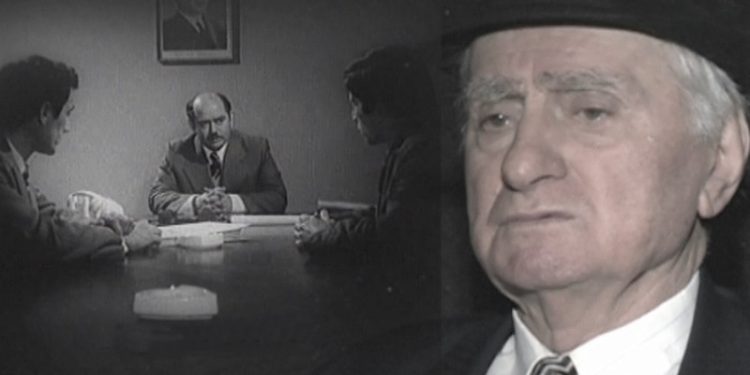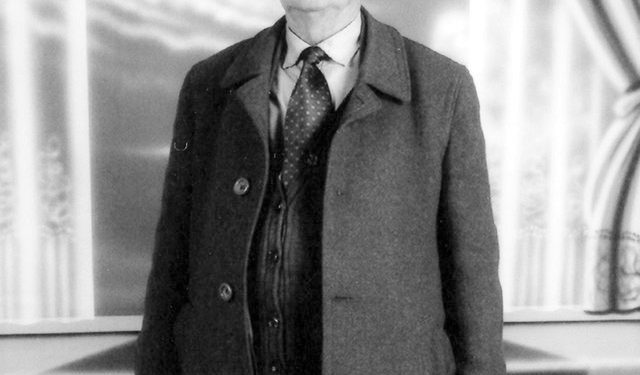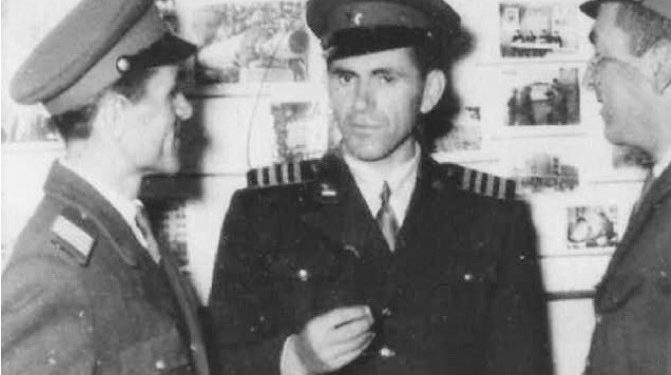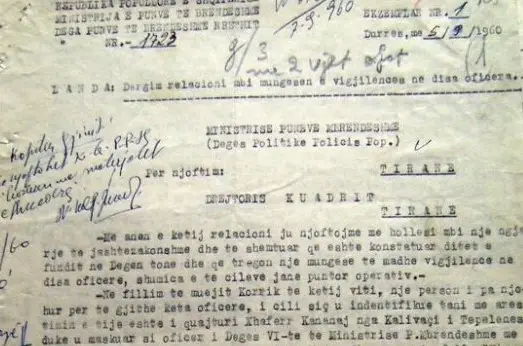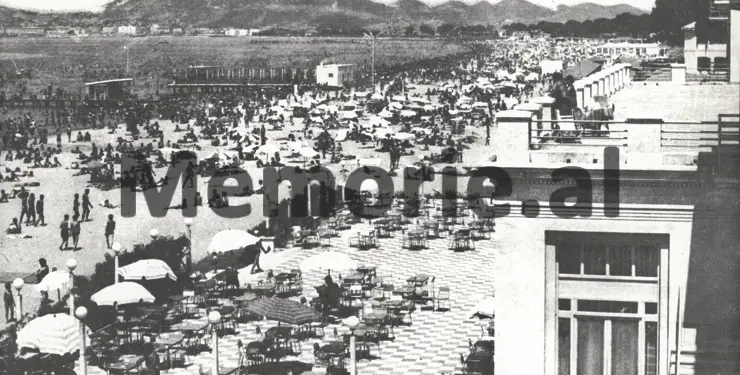By Florenc Bakillari
Second part
– The rare story of the villager from Kalivaçi i Tepelena who, after announcing himself as a Security officer, presented himself as Kadri Hazbiu’s special envoy, in the Internal Affairs Branches in Shkodër and Durrës-
Memorie.al / Xhaferr Kanani, the rare character, in his account of the extremely dangerous adventure he undertook in 1960, that of his being declared an officer of the State Security and then his presentation to his “colleagues” in the Department of Interior of Shkodra and that of Durrës. Even after almost five decades from that time, he wondered about the lack of vigilance there, right in the den, where the plans for the arrests, tortures, persecutions, imprisonments and exiles of dozens of Shkodran citizens were hatched. Xhaferri would be surprised by the presentation and the warm reception given to him by the top leaders of the Internal Affairs Branch of Shkodra, starting with the chairman, Colonel Feçor Shehu, the Chief of Police, Colonel Skënder Vinçani, the Chief of Security, Lieutenant Colonel Hysen Hoxhati , etc. After becoming known in Shkodër, he decided to continue his dangerous game in the city of Durrës. Shkodra would give Xhaferr Kanan, the fake major, the pleasure of accompanying Prime Minister Mehmet Shehu, who visited the northern city in the summer of 1960, while Durrës would accompany Enver Hoxha during his visit to the Labor Party. of Albania, Enver Hoxha, accompanied by most of the members of the Political Bureau, had come to the coastal city to see off Maurice Torrez, the head of the Communist Party of France, after his several-day visit to our country. The history of his “inspection, as a special envoy of the minister Kadri Hazbiu” in Shkodër and Durrës, has been described in detail by the character of our article, Xhaferr Kanani, in his long interview, which will be published in several numbers.
Continues from last issue
The story of the villager of Kalivaç, who himself was declared “major” of the State Security, is getting more and more interesting. In today’s issue, you will read the meetings of the “major”, who looked a lot like Kadri Hazbiu, with senior officers of the Ministry of the Interior, who remembered that he served in the Durrës Branch. While the “colleagues” of the coastal city, as they saw him with their superiors from the center, assumed that he was the special envoy of the Minister of the Interior.
In his interview, Kanani tells how he solved the problems of foreign vacationers, mainly those from East Germany, with the Durrës Beach police. With an oratory and intelligence gifted by nature, the young man from Kalivaç faced the Germans, even giving speeches after the prayer he received from the Interior Department, to resolve the conflicts between the police and foreigners.
Mr. Kanani, have you been asked to meet major officers of the Ministry of the Interior?
I have met several times with such high-ranking people and major leaders of the State Security. We also drank coffee with them. When the latter saw me with the officers of the Internal Affairs Branch of Durrës, they thought that I was effective and a colleague with them. And the officers of Durrës, when they saw me with their superiors of the Ministry of the Interior, thought that I was the one I had told them, the special envoy of Kadri Hazbiu.
I had entered the leadership “Block” several times, taking advantage of my acquaintance with the commander of the Guard, Colonel Çelo Arrza. I met several times Ramiz Ali, Manush Mufti, Rita Marko, Gogo Nushi. They asked me about the foreigners vacationing on Durrës Beach and I told them everything I thought, in short conversations of course, about how Germans, Poles, Czechs, etc. behaved.
Did you happen to intervene in any case to give an opinion regarding the arrests or detentions carried out by the State Security in Durrës?
Yes, there have been many cases when I have saved people targeted by State Security. I often went to the Beach Police Station, where the police stopped many citizens. I went and asked them about the reasons for the detentions and in most cases, I ordered them to be released. “As the special envoy of Kadri Hazbiu”, to observe the agency activity of foreigners in Durrës Beach, I was given the opportunity to have a lot of information about the actions of the tourists who came at that time. At that time, many tourists from East Germany came to Durres Beach and rested at the youth camp in Durres. Tents had been set up for them and the police had encountered several misdemeanors by foreigners.
The policemen were always suspicious of Albanians who socialized with foreigners, but at the same time they prejudiced the latter, calling them agents. In many cases, the Albanians were escorted to the posts and I intervened so that they were not detained, because they were young and these actions were of age. In the same way, I had told them that there was no need to be so critical of foreigners as they came from friendly countries and should not be seen as agents.
What were the clashes between the policemen and the foreign vacationers at Durrës Beach?
I remember that the policemen who served during the beach period, came from the districts and found that the foreigners, with their cameras, had taken many photos. But not all presented the beauties of Durrës, as many of them were negative in the opinion of the specialists of that time. Under these conditions, the police were forced to take their cameras and destroy their film to somehow hide the truth from the eyes of Europe. Those foreigners who objected to the actions of the police were often brought to the beach post.
These cases had become a problem. The tourists, especially the Germans, were organized and accompanied by a leader who was called the chief of staff of the vacationers. In the specific case, this case asked the Internal Affairs Branch of Durrës for clarifications as to why vacationers were treated this way. This was a defect in police-tourist relations. The head of the Internal Affairs Department of Durrës, Kopi Niko, instructed the chief of police, lieutenant colonel Taqo Luarasi, to meet with the Germans together with me and two officers.
What happened in this meeting?
First, they brought us a translator, he was a lecturer at the University of Tirana and as far as I remember, he was from Gjirokastra and his name was Nusret. We went to a meeting with the German vacationers, who were commanded by the Chief of the Camp Staff. As soon as we entered there was silence. The foreign vacationers demanded to know why the police forbade young Albanians to associate with them. Also, another question was whether they, the girls, were allowed to marry Albanians. They asked us to account, why our policemen told the Albanians not to hang out with the Germans because they were agents. One of the girls stood up and said that she and her friends preferred Albanians because of their temperament. Chief Taqoja tells me to take the situation in hand, as he had no experience in these jobs.
As a result, Nusreti and I tarnished the conversation. I told them that when our people went to their country, they acted according to the law and rules of their country. Therefore, they should do the same, respect the traditions, the rules, not creating problems with the police. I continued by telling them that it was not at all true that Albanians were forbidden to associate with them, since Albania and the German Democratic Republic were friendly countries.
As far as the marriage relationship was concerned, this was a question that should be asked to the higher authorities and the government. I told them about the love with the Albanians, who can stop, but they should have their minds, be careful and not stay near the house of some fanatical citizen, as this could cause problems. They should have stayed, therefore, in places where such things were allowed. Regarding the complaint that the police allegedly told the agents, I replied that this was not true.
Did you assist in any incident while serving in Durrës?
I remember one case, when I was standing on the beach, at the workers’ camp, the head of Crimes of the Interior Department, Fane Xhuveli, told me that there had been a suicide in the village of Çetë i Kavaja. He told me I should go with him, but we also needed a car. I told Kristo Themelko, if I could take his car. He told me to let his car be broken into pieces, for the affairs of the Ministry of the Interior. We took the car and with me were the district prosecutor, Riza Teqja, the coroner, Koçi Moisiu, and the chief of crimes, Fane Xhuveli.
An old man had hanged himself there. When we arrived at the place and did the actions, I realized that they wanted to arrest the son of the deceased, as they suspected that he might have killed his father. I told them that they had no facts about this and it should not have happened like this. After the expertise, they told me that I should also sign the minutes and that’s what I did. This was also brought up as a charge in my trial.
And weapons, did you carry them yourself?
Yes, I did, I even want to tell you that on the way to the village of Çetë i Kavajë, while talking with my “colleagues”, I noticed a strange fact. None of the cadres I was with had weapons with them. Only I had an Italian “Bereta”, but without cartridges. I had received it at the Armament Branch in Durrës. I had told them that I had a Soviet pistol, which was very heavy and annoying. So, I asked them to give me a smaller gun. They gave me an Italian “Bereta”, there were no cartridges for it. I had never shot with that pistol and I didn’t even know how to use it.
Kanani: “How did I fill Feçor Shehu’s mind that. I was a State Security officer”?!
In Xhaferr Kanani’s fraud net, the former head of the Internal Affairs Branch of Shkodra, who later became the Minister of the Interior, was the first to fall. The self-proclaimed major told everything about the eight months of his life as a fake State Security employee. He was talking about combinations of Branches that he visited as a special envoy of Kadri Hazbi. Kanani told that when he felt in difficulty and why he thought Feçorr Shehu was credulous and professionally incompetent. How did he feel after 47 years, for the fact that he ruined the careers of many officers and for which he felt more regret and apologized? These and other interesting stories come through the interview of the rare character, who cleverly infiltrated the ranks of the State Security.
Do you remember any combination that the Durrës Branch prepared for the arrest of any element, the so-called enemy?
I want to bring to the reader an interesting memory, related to the preparations made by the leaders of the Department of Internal Affairs of Durrës, directed by Kopi Niko, for the arrest of a police lieutenant colonel. His name was Miltiades the Pope. It had been some time that the operatives of the Security had been under surveillance and were preparing little by little the moment to handcuff him. It was suspected that the lieutenant colonel and a prosecutor, who was arrested in Tirana, were related to Teme Sejko. I didn’t know Miltiadh Papa closely, but once, I had the opportunity, very briefly, to have a coffee with him. He looked like he wanted to tell me something, but I had the information that any day he would end up in the cell.
I felt sorry for him, because he seemed like a very good man. Even while we were drinking coffee, I wanted to give him a signal about what was happening around him, but every time I tried, he changed the conversation to let me understand that, he also knew, the end of his surveillance. While we were drinking coffee, I saw two Security operatives hurrying from where we were towards the Internal Affairs Branch of Durrës and I asked Miltiadhi: “Where are those two operatives going? Why are they in a hurry”?! He told me: “They do their duty. They want anyone to get to our superiors first to report what they saw. I don’t blame them.” This clearly explained the drama that was being played with the fate of Miltiadhi and others, classified as collaborators of Teme Sejko and agents of foreign services.
Durrës was also a favorite place for escapes from the sea, especially with the entrances to the foreign steamers that came to the port. Have there been any cases of people being caught red-handed attempting this type of escape?
I want to talk about the fate of the three Himarjots, who had come to escape to Durrës. They had hidden their clothes under the sand and, swimming a few miles away, had boarded a Turkish steamer, just before it departed. The crew were amazed that two of the boys (as one of them had not managed to make it) had swum so far from the shore. The captain had interrogated them, and my opinion is only that they were Christians, they did not decide to hold them, but then they gave the alarm signal and informed the Albanian port authorities that there were two Albanian citizens on board, who had boarded illegally.
Our police went and got them and the next day they also informed me about what had happened. The police had beaten them so badly that one of them was bleeding in the stomach and spitting blood. Naked as they were, they had been left in the cold cells of the Internal Affairs Branch of Durrës and were freezing. I saw them and they hurt me. I told the police leaders that they should be given something to wear and one of them, who was very sick, should receive first aid. They told me that they would now take them to the beach, as they had hidden the clothes there. They took them in one of the cars. We went to the beach.
The two boys were made to dig in the sand to find the clothes. From there they took out three pairs of clothes. Here they themselves realized that the third one who had been with them had lost the battle with the sea. So he was drowned. They began to cry and begged to be treated as human beings regardless of what they had done. However, their punishment was very severe. They were sentenced to many years in prison. At that moment, it occurred to me to talk to Colonel Kopi Niko, the head of the Internal Affairs Department of Durrës, to intervene to pave the detention cells with cement, where the detainees would be housed, since I would also go there one day itself.
The cells were laid out. In this context, I also want to mention a case when two teachers from Vlora were denounced by two bad girls from Elbasan. Some baseless and unjust accusations had been made against them and this prompted me to help them. I realized that they were not at fault. I clarified the circumstances in which the meeting with the girls had taken place and the stay with them. And we came to the conclusion that both boys were innocent. With this conclusion in mind, I intervened and made it possible to avoid their punishment.
Has anyone asked you for any documents proving that you were a Security officer?
To be honest, in the Internal Affairs Branch of Shkodra and Durrës, no one had asked to prove the authenticity of my being as a Security officer. Feçor Shehu, who ran the Shkodra Branch, never suspected that I was a fake major. In fact, he was the person responsible for getting me into the cheating combo. This was also the person who, when I was exposed and the truth came out, took revenge on me more than anyone else. 38 officers were fired for lack of vigilance, but Feçor Shehu survived even though he was “fished” first and he somehow, with his light-heartedness, had to bear more responsibility.
However, I want to clarify that in addition to these, there were also people who put me in a difficult position, with their provocative questions, and I sweated to answer them because I was in an inferior position to them. The only person who asked for my identification document was a captain of the Beijing Police Post. Short in stature, but very correct and determined, while I was leaving a shoemaker in the city of Beijing, he approached me, honored me and was taking something out of his pocket.
After that, with his document in hand, he asked me for my identification document. I didn’t know how to get out of this situation. The captain did not leave me and repeated his request until one of his superiors, with the rank of lieutenant, came there, with whom we hugged as if we had known each other for a long time. I complained to the lieutenant about his subordinate’s request. He ordered him to leave, and the captain, who had been completely right, felt embarrassed when his superiors forced him not to carry out his duty. /Memorie.al
The next issue follows




